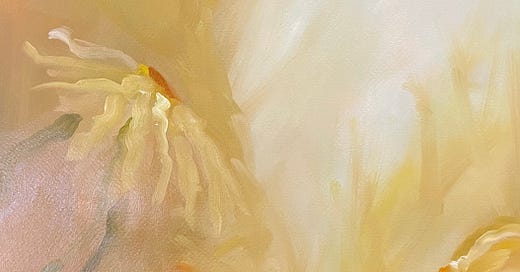Some of you may know that I recently returned from a vacation with my family in Mexico. While I was there, I was treated to extraordinary weather, walks on the beach, bike and horseback rides, and moments just resting in the sand. During a gentle stroll in the brilliant sun along the shore, dodging stranded man o wars, I noticed a feeling of vulnerability. Despite the paradisiacal environs, the waves crashed somewhat haphazardly against sharp rocks. Currents going several directions in green blue and blue, the sun, potentially brutal on my white skin, the sand, warm, but becoming hotter-all reminded me of my gentle human state. I am a mere body in time. I am limited, and here, by the sea, I felt my smallness. Maybe the oceans, vast and chopped by whale breaches, represent the eternal to my finitude. I wrapped my light shawl around me, shivering in my awareness of this truth.
But I didn’t like the feeling. Very subtly, and almost without my own will, I shifted. Instead of identifying with my small and fragile human body, I made the to move to identify with the spaciousness of the sand and water, in totality. Instantly I was peaceful. No longer a spot in the scene, I became the field of vision I had previously imagined that I was within. Ah, what a relief that was! I let myself forget the finitude of my being and entered the awareness of a bird’s eye view. Except there was no bird’s eye, only view.
Who sees and who is seen? Am I the one who sees as well as the seen? Can I be both, can I be neither?
I think of the act of painting. This can be done from many standpoints. Sometimes I am the author, the mini god who orchestrates a scene. I get to choose the composition. I make decisions and determine the mood with my colors and strokes. But that is not my favorite way to paint, though the paintings may be better.
My favorite way is to abandon my sense of self, like I did on the beach, and turn to a sort of listening to my colors. Like the author who says he or she responds to the appearance of the characters that people their novel, I become the recipient of some strangely other force. This is the flow state.
I imagine our ancient forebears- the cave artists shaping figures in the shadows of caves; using the curves of stone to round out haunches of beasts, giants of their world. Were they composers when they painted thus? Or were they caught by the spell of some deep mandate that brought their world to light in the flickering of fire?
Can you practice making art in both these ways? What marks or words come forth when you are there as an identity, a mini god as I suggested, who orchestrates a world? And if you shift, dropping off the sense of self until nothing remains but brush and color, surface and visual sound-can you still paint? Or rather, can painting happen?
Namaste,
Leslie





I think about the state of playing, where all things become possible. You can be the sun. You can be a butterfly. Worlds appear before you, and they slip away just as easily. But something changes in us as we age. We lose our trust in play. We feel ourselves to be vulnerable in ways that children are not— ironic, isn’t it, that we see children as profoundly vulnerable, yet to be a child is to be like a god. How can we stand in the intersect of these states of mind?
Lovely and profound guidance - thank you!